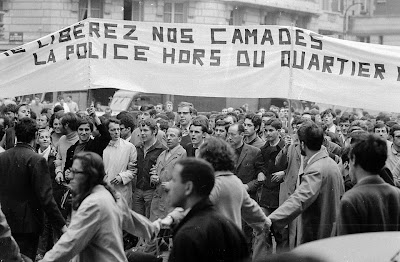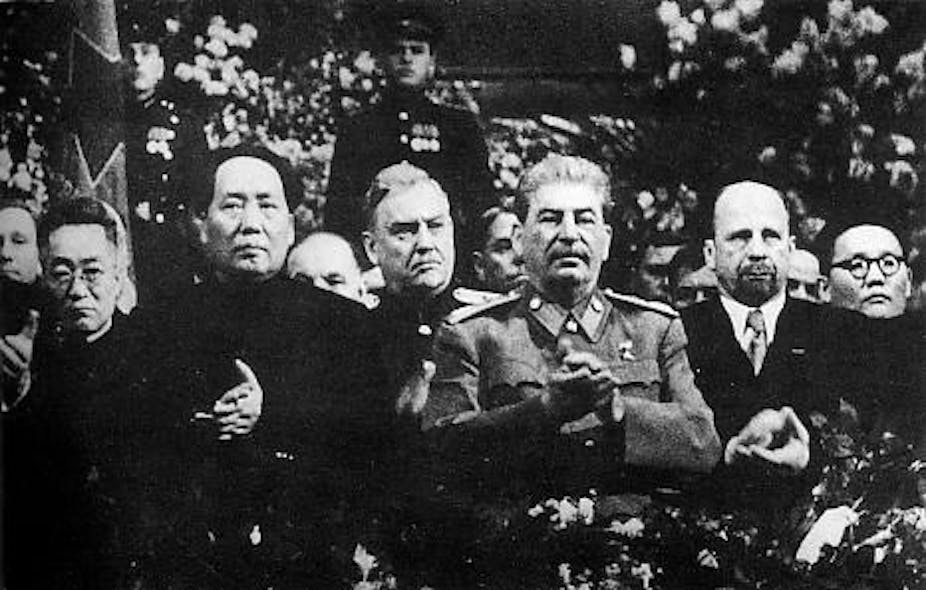Joseph Stalin: The man of Steel
The Soviet Union (besides the USA) was the only power that mainstream historians would say had ‘won’ the Second Great War. Yes the caucuses and much of Central Asia had been occupied, but the Soviet Union now had access to the bountry of Manchuria, access to warm water ports and influence over Northern India. Of course this had come at the cost of around 5 million Soviet dead, but that was a small price to pay.
Enthusiastic workers reacting joyously to comrade Stalin's announcement that they are to move to Central Asia
The Second Great Purge
There were some who expected a level of liberalization within the Soviet Union given the Soviet victory, but those people would soon find themselves in the New Soviet Towns. Following a short period of relative liberalization between 1945-48 with some relaxation of censorship and the release of some political prisoners (mostly Trotskyists) the “Second Great Purge” would be launched. However, while brutal - this Second Great Purge would not be as fatal as the past one was.
The main focus of the “Second Great Purge” was to ‘nip the bud of Nationalist-Fascism” in the bud. To accomplish this, Stalin wanted to dlilute the ‘pool of traitors’ 50% of Central Asia was essentially depopulated of it’s native peoples with Central Asians being moved to Poland, the Caucuses being moved to Russia the Polish being moved to Russia (but not nearly to the same extent), the Jews being moved to the Polish-Lithuanian Commonwealth (in regions near the German border but well away from the Lithuanian coastline), Baltics being moved to Russia and last but not least the Russian , Russians being moved to Central Asia and the Caucuses
After the collapse of Monarcho-Communism with the fall of Britain to fascism, a similar process took place in Bulgaria and Romania but the Communist Party of Greece (KKE) and President Flokaris was more resistant to Soviet control compared to the rest of the balkans given their more or less independent liberation of Greece and the back-channel communications between Athens and Nanking.
The main intention of these population transfers were to isolate ‘disloyal minorities’ by integrating them within a foreign culture. The idea is that the stigma and alienation that these cultures would face in a completely new environment would make them completely dependent on the Soviet state. Furthermore, population transfers would deprive the Chinese of willing collaborators in Central Asia and the Germans of willing collaborators in Central Asia.
All in all, more than 30 million people were transferred across the Soviet Union across this period of 1945-1956. However, remarkably there were very few casualties in this round of purges compared to the last round with the number of deaths only around 50,000 - a remarkably small number given the scale.
Students rallying to the defence of the Republic near the Elysee Palace
“Co-tolerance” with Trotskyists
The main reason for the ‘softness’ of Stalin’s new approach was a uneasy “Co-Tolerance” that had developed with Trotkyist France. President Andre Breton was a surrealist artist who had developed a fond friendship with Leon Trotsky after him getting lost in Mexico City ended up him blundering straight onto an attempted assassin with a sniper rifle. The grateful Trotsky hosted Breton and converted him to the more liberal, more revolutionary, more international version of communism that Trotkyism was fast evolving into. After a bill to colonize Algeria was tabled through the French Parliament, the conservative sections of society worked quickly to mobilize behind Petain - an anti-communist of impeccable anti-fascist credentials also. They could tolerate the syndicalization of the economy, shorter work weeks and higher wages - as those all could be undone - but independence could not and would not be undone.
So on the 21 April 1948, Military Chief of Staff Charles Nogues, Grand Admiral Francois Darlan and Head of Air Force Jean Romatet launched the coup. At first the coup looked to be a great success. Algiers fell without much bloodshed and much of Paris was seized by paratroopers and elements of the regular army. The parties of the right and center that were not with the government convened at Parliament to remove President Breton and instal a new government to office - one headed by Petain. President Breton was trapped in the Elysee with loyalist members of parliament and the Republican Guard. However, despite the seeming strength of the Putsch, their failure to secure President Breton meant that he continued to broadcast defiant appeals from the Elysee, meaning that much of the professional army stayed in the barracks.
The unions called for a general strike. As did the parties of the French left. Thorez, the chief of the PCF (French Communist Party) joined the strikes after a call with Stalin. All over Paris lines of people formed in front of the Elysee. Although the Presidential Guard was hopelessly outnumbered by the regular army, the people formed a barricade. When the paratroopers led by Edgar Puaud arrived to try and disperse the people - they hesitated to fire on the crowds. Yes - they were red French, socialists, malingerers, agitators and communists - but they were still French!
But the air force had no such hesitation - several DWs arrived to strafe the Presdential palace and the bombs fell loose among the crowds - dispersing much of them. A small fraction took up arms and retreated around the palace. The siege of the Elysee had begun.
But Major General De Gaulle was outraged by the actions of the coupists, like any Catholic he had no love for these godless reds and these degenerate atheists, but to him it was unacceptable to shed the blood of civilians. The decision was made.
De Gaulle’s troops raced with him to Paris and turned the tide. With Paris secured and the news of the Elysee massacre inflaming the streets, the coup collapsed. The Putschists surrendered and much of the traitor parliament also surrendered with a small fraction managing to flee - either to Britain or Germany.
With the putsch collapsed, order was restored - but the Republic had fundamentally changed. The parties of the right and center were discredited by the participation in the Elysee Massacre. President Breton - while still disapproving of the thuggery of Stalinism saw that France had no other allies she could turn to. America was still in the thrall of isolationism - and even if it wasn’t - President Wallace was far behind in the polls with President Dewey only a friend to money. They didn’t have to be friends with Stalin - just exercise a ‘mutual co-toleration.’ Besides, the PCF were true patriots after all - standing with the Republic against the putsch.
While Stalin's attention was occupied internationally, progress continued. Although Soviet industry endured some disruption with the population transfers, the influx of people into a system where they were essentially slaves and completely dependent on the state did wonders for productivity. Soviet industry was massively increased with the military receiving the bulk of the surplus. Advanced tanks and advanced planes for the first time ever were world class with the T-54 and the Mig-20 being the best tanks and planes in the world. However, Stalin fretted - why had Germany and China fallen so far behind despite spending so much of their budget in the military. Sure the fascist regimes were corrupt to their core - but surely not that corrupt?
Stalin received their answer on new year's day on January 1955. Despite his scientist's assurances that such a bomb would not be produced for at least another 3 decades, the Axis had gone and done it. This forced Stalin and Breton even closer together with the rampant saber-rattling of the Axis and increased military exercises causing concerns that another invasion was near - an invasion where the Soviet Union had no effective response.
Say "long live the victory of the working classes and the eventual triumph of the proletariat over fascism"
Manchuria and China
But Stalin was more clever than that, seeing Chiang's stroke as an opportunity for a fundamental realignment - he ordered that Zhuoulin be bought back in line. Their ‘puppet’ had become uppity and would not take orders from either Moscow or Nanking - loudly declaring his autonomy. But with the Zhoulin family ‘safely’ in Moscow by Mayday 1955 Zhoulin had no choice but to back Moscow’s man. With the Chiang family split the Professor of Botany and the Secretary of Agricultural Affairs Mao Zedong would win with 35% of the vote against the 33% of Chingkuo and the 32% of Weikou.
Stalin’s death would come two weeks after his greatest triumph. The visit of President Mao to Moscow in 1956 was supposed to signal a new age and the coming triumph of worldwide communism.
But then Stalin had an aneurysm and was found dead the next morning. While the tragi-comic farce of the succession is immortalized in the “Death of Stalin” - his death (within a month of Hitler and Chiang’s death the year before) signalled the end of an era that was forged by the three men. Who would have the strength to succeed the man of Steel?
OOC: Alright - time for more guesses - who succeeds Stalin? (Unless I've asked this question - have I asked this question? I'm sure I asked for Chiang and Hitler)


